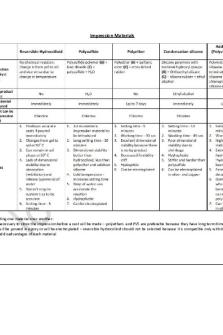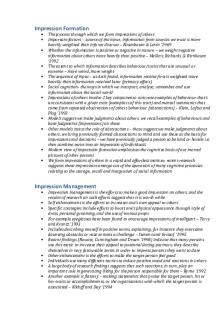Workplace etiquette and impression management PDF

| Title | Workplace etiquette and impression management |
|---|---|
| Author | Ti Sh |
| Course | Career Planning and Management |
| Institution | University of New South Wales |
| Pages | 2 |
| File Size | 228.6 KB |
| File Type | |
| Total Downloads | 62 |
| Total Views | 160 |
Summary
Workplace Etiquette and Impression Management...
Description
Career and Employment Service
Impression Management & Workplace Etiquette WHAT IS IMPRESSION MANAGEMENT?
of appropriate dress Keep your desk and work area tidy Use shared facilities with respect and keep kitchen area clean
It is presenting yourself in a controlled and appropriate manner to develop and maintain a positive public image.
IMPRESSION MANAGEMENT How can you create a positive impression?
SOUND Monitor the volume of conversations Keep personal telephone conversations to a minimum Good practice to have mobile phone on silent during the day If listening to your iPod while working, be conscious of the volume and ensure it does not disturb others Maintain privacy – keep all workplace conversations professional Avoid taking personal calls at work or speaking on the phone for prolonged periods Avoid interrupting or talking over people Be diplomatic when interacting with all colleagues including colleagues you may find difficult Mind your manners. Say ‘please’, ‘thank you’ and ‘sorry’ DON’T GOSSIP
Dress appropriately Don’t chew gum Always be on time Be positive and professional at all times Respect others around you Show “can do” attitude and enthusiasm Take initiative Work hard Ask questions, show curiosity and genuine interest
WHAT IS ETIQUETTE? Rules of socially acceptable behaviour based on principles of respect, consideration and honesty that can be applied to a range of contexts including general business conduct, work & university. ETIQUETTE Behaving in an acceptable & professional manner will help you to:
Build and maintain your professional reputation Provide a positive impression in the eyes of others Maximise your chances of fostering positive networks
IN THE WORKPLACE Foster a happy and stress-free environment Avoid work-place tension Avoid misunderstandings Help you develop and maintain good working relationships Good etiquette should be adopted in all scenarios, inside the office and outside, to ensure that practice makes perfect.
SMELL Be sensitive to scents and smell surrounding you, i.e. perfumes, colognes If eating at your desk, avoid eating foods strong in aromas Take care of your own personal hygiene TOUCH Respect people’s personal space – don’t stand over them or stand too close to them Avoid touching people whilst communicating with them Do not use threatening gestures or body language Have a firm handshake LOOKING PROFESSIONAL Forming a positive impression is not only about appropriate behaviour, but also appropriate dress.
Workplace etiquette differs across countries, regions and cultures Be sensitive to your surroundings and adapt your workplace behaviour and etiquette to suit the context Being respectful allows you to be adaptive & flexible enough to recognize the value of other people, even if their backgrounds or beliefs are different than your own APPROPRIATE WORKPLACE BEHAVIOUR Appropriate workplace behaviour can be categorised using senses. SIGHT Looking the part and dressing appropriately Dress code will vary depending on the industry and business Look at pictures on the organisation’s website to get a sense
Men Do's
Don'ts
Collared shirt
Shorts/T-Shirt/Casual polo shirts
Ties
Torn/dirty/crumpled clothing
Smart/dark shoes (black brown, Hats/beanies grey or dark navy blue) Trousers
Thongs, trainers
Women Do's
Don'ts
Collared shirt
T-Shirt
Smart/dark shoes (black, brown, grey or dark navy blue)
Plunging neckline, strapless, halter neck tops
Skirt (knee length)
Torn/dirty/crumpled clothing
Black, navy or beige stockings
Hats/beanies
Blouse
Thongs, trainers, stilettos
Blazer or tailored/fitted jacket
Short skirts
Natural make-up
Coloured/fishnet stockings
NOTE: It is always better to be overdressed rather than underdressed. Dressing professionally helps to boost confidence too!
Consider the following: Profile picture: What does your profile picture say about you? Photos/albums: What photos do you have uploaded? Remove inappropriate pictures Applications/groups: What do your applications and groups say about you? Sometimes you join groups because at the time they were funny and a novelty. You may want to consider filtering through these Status updates: What are your status updates like? Are they overly cryptic, dark, aggressive, defensive? Or are they generally happy, chirpy, positive status’ about mundane events? How do they represent your personality and attitude to life? Wall posts: Who is writing on your wall and what are they saying? What image do your friends portray about you? What assumptions could a recruiter make on what is written on your wall? Some Facebook users have two distinct profiles, one which is personal and one which is professional profile. This is an option that may be useful to consider in certain industries where public behaviour is considered a reflection of the organisations brand and image.
WORKPLACE ETIQUETTE Other factors to consider:
Reflect good work ethic by arriving on time. Train yourself to be punctual or early If you are late for work due to unforeseen circumstances, inform your manager as soon as possible about the delay and stay back and make up for it Workplace etiquette does not only apply to your direct colleagues but anyone who occupies your office space, including clearners and delivery staff Don’t check your phone during meetings at work Be sensitive to others, particularly to cultural differences. Respect, value and appreciate differences in the workplace Be honest. Don’t overpromise and under deliver. Always try to deliver what you say Try and keep emails as short as possible to prevent overloading Consider your web browsing habits. Although employers must inform you if your internet usage is monitored, try to keep your web usage to mostly work related matters When passing by others when walking to the amenities, kitchen and elsewhere, it is always polite to greet them
FACEBOOK AND IMPRESSION MANAGEMENT What does your Facebook profile say about you? How are others likely to interpret your profile? Many would argue that Facebook is a reflection of their personal not professional life and therefore should not be filtered. Despite claims such as this, more and more recruiters and interviewers are checking potential candidate profiles. Some are even asking candidates in the interview to log in to their Facebook accounts on the spot! While users generally succeed at presenting a positive image of themselves, Facebook users are only partially aware of how they are coming across and tend to underestimate the strength of the impressions they foster.
Think twice before adding colleagues and managers as friends. It is appropriate to decline such friendship requests during the term of your employment. You can still have a fun and festive Facebook profile even if it is a little bit more guarded LINKEDIN AND IMPRESSION MANAGEMENT Linked In is a valuable tool for professional networking and job seeking. Recruiters and interviews will often research candidates through this networking resource. In creating a positive professional image of yourself, consider the following: Image: Your profile is professional and updated. Your profile picture should be a head-shot which is friendly yet professional Accuracy: Avoid providing false or misleading information. Recruiters and interviewers will cross-check information against your resume, interview responses and references WHAT IS NETIQUETTE? Derived from the words “network” and “etiquette”, it is the social code of network communication. RULES OF NETIQUETTE 1. Spell check 2. Not all CAPS. CAPS reflects yelling 3. Do not engage in flaming, which is escalating a heated conversation over email 4. Do not spam colleagues with inappropriate emails 5. Address others professionally and by name 6. Sign off emails professionally e.g. “Kind regards”, “Many thanks” etc. 7. Avoid swearing 8. Avoid emoticons in work related correspondence 9. When talking or emailing colleagues, avoid using ‘text-speak’, such as LOL and OMG
Be cautious of what publically available information you are presenting about yourself. Everything on the internet including Facebook is permanent.
FIND OUT MORE Macquarie University NSW 2109 Australia T: +61 (2) 9850 7372 [email protected] www.careerhub.mq.edu.au...
Similar Free PDFs

Impression Management Notes
- 3 Pages

Management theories in workplace
- 8 Pages

Workplace Appearance and Attire
- 10 Pages

Impression Materials
- 2 Pages

First impression
- 9 Pages

Workplace Safety and Insurance Act
- 25 Pages

Memoire bon impression
- 47 Pages

Business Etiquette in Brazil
- 5 Pages

FIS 205 Impression Evidence
- 9 Pages

Basic Social Etiquette Rules
- 6 Pages
Popular Institutions
- Tinajero National High School - Annex
- Politeknik Caltex Riau
- Yokohama City University
- SGT University
- University of Al-Qadisiyah
- Divine Word College of Vigan
- Techniek College Rotterdam
- Universidade de Santiago
- Universiti Teknologi MARA Cawangan Johor Kampus Pasir Gudang
- Poltekkes Kemenkes Yogyakarta
- Baguio City National High School
- Colegio san marcos
- preparatoria uno
- Centro de Bachillerato Tecnológico Industrial y de Servicios No. 107
- Dalian Maritime University
- Quang Trung Secondary School
- Colegio Tecnológico en Informática
- Corporación Regional de Educación Superior
- Grupo CEDVA
- Dar Al Uloom University
- Centro de Estudios Preuniversitarios de la Universidad Nacional de Ingeniería
- 上智大学
- Aakash International School, Nuna Majara
- San Felipe Neri Catholic School
- Kang Chiao International School - New Taipei City
- Misamis Occidental National High School
- Institución Educativa Escuela Normal Juan Ladrilleros
- Kolehiyo ng Pantukan
- Batanes State College
- Instituto Continental
- Sekolah Menengah Kejuruan Kesehatan Kaltara (Tarakan)
- Colegio de La Inmaculada Concepcion - Cebu





